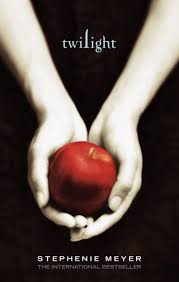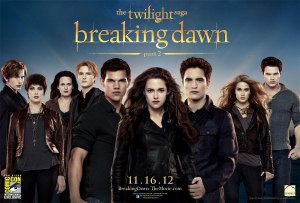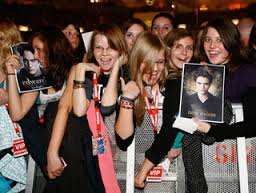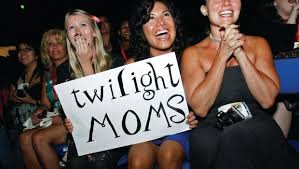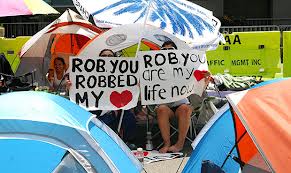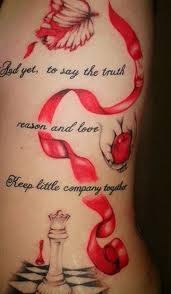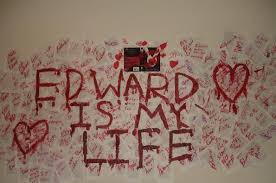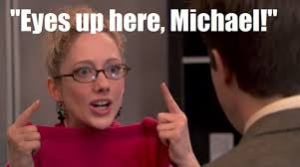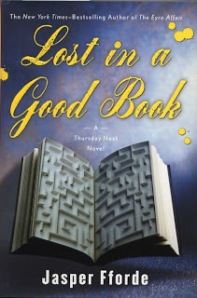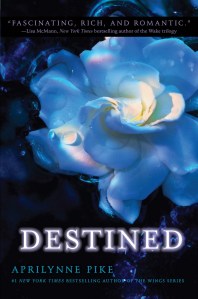Sorry in advance for being all CAPSLOCK!-y on you today, folks.
So Stephenie Meyer, as you may know, is a producer now. Her production company’s first release (Austenland, hooray!) is coming out soon and she’s been doing the press tour for it and, as part of that press tour, she recently did an interview with Variety (as one does).
And in this interview, OF COURSE the interviewer goes there. And SM responded thusly:
DM: What about a return to “Twilight?”
SM: I get further away every day. I am so over it. For me, it’s not a happy place to be.
DM: Is the door completely closed on that?
SM: Not completely. What I would probably do is three paragraphs on my blog saying which of the characters died. I’m interested in spending time in other worlds, like Middle-Earth.
Whereupon the interwebs promptly exploded with the rage of the Twilight fandom. How dare she say she’s “over it”? How dare she write anything flippant about these characters? How dare she disrespect her fans this way? SHE OWES US. SHE IS NOTHING WITHOUT US. WE BOUGHT HER HER HOUSE DAGNABBIT! (language cleaned up for the sake of the tiny tots, obviously.)
And on Twitter at least, it wasn’t just the Twilight fans. Some writers were also upset, though definitely not quite to the same level. Their beef was generally along these lines: “If I ever say I am so over [INSERT NAME OF THEIR DEBUT NOVEL HERE] you have permission to push me overboard off of my yacht while I am drinking champagne.” (This part really reminded me of the mommy wars section of the internet: If you are not treating your manuscript-child with the same love and reverence with which I treat my own manuscript-child you are no proper author and you probably WROTE YOUR BOOK SITTING IN A COFFEE SHOP PUMPED FULL OF CAFFEINE INSTEAD OF WRITING IT IN THE LOVING ENVIRONMENT OF YOUR OWN HOME ALL NATURAL THE WAY GOD INTENDED.)
(Sorry for that digression.)
So I’d just like to take this moment to say to anyone who got upset with Stephenie Meyer for the above quote:
LIGHTEN UP.
I have several issues with this latest backlash against her, several of which were already summed up in various places on Twitter by talented authors, agents, and readers. Sadly, I don’t have links to all of these excellent comments. (If you really want to see a good sampling, though, check out Maggie Steifvater’s Twitter account. It’s a good place to start.) So let me just say a few things myself.
1. SM did not say that she hates the Twilight books, nor did she spit upon them, nor did she laugh at anyone who read them, nor did she insult her fans in any way here. She simply said she is over Twilight. Now, eight-ish years ago, the word “Twilight” would have meant this:
These days the word “Twilight” encompasses much, much more:


And most particularly, this. (Out of respect for SM, these are the only pictures of this type I’ll be posting, but the attacks both against the books/movies and Meyer herself are myriad and staggering. Full disclosure, I do find some of the Twilight mockery to be hilarious if done well, but much of it is sheer malice and hatred for the sake of hating.)

And let’s not forget the fun of having her intellectual property stolen and leaked all over the internet.
Now, leaving all questions of money aside, imagine that level of both devotion and hatred was your life for the last 10 years. Wouldn’t you be over it, too? Wouldn’t you maybe agree that it’s not a happy place to be?
Now, even considering the money, as Maggie Steifvater pointed out, if you were offered $3,000,000 to be cursed at every time you did everyday errands like shopping, would it still be worth it? I’m sure SM is grateful for the blessings Twilight has brought to her. But you can still be over something and remain grateful for the blessings it’s brought you. Personal example: I’ve struggled with infertility for years. I’ve met great friends because of it. I love my son in a deeper and different way than I might otherwise have done. I’ve learned a lot and grown as a person, and I’m grateful for all these things. But I am SO OVER infertility itself. It’s not a happy place to be.
2. Fans: Stephenie Meyer does not owe you anything. You pulled this argument once before when SM said she wasn’t going to finish writing Midnight Sun after the incomplete draft was leaked onto the internet. She didn’t owe that book to you then and she doesn’t owe anything to you now. Neil Gaiman explained this pretty well in reference to George R. R. Martin and readers’ entitlement issues (slight language warning). Twilight fans: the deal was, Stephenie wrote the books, and you paid for them. That’s the end of the deal between you right there. Anything else she chooses to do to interact with you or as regards writing more words is her choice and hers alone. She does not owe you anything new because you haven’t paid for anything new. You paying her the money was you fulfilling your part of the bargain as reader. You’ve already gotten your money’s worth. She didn’t force you to buy her books; you did that freely. You have no more claim on that money, and no claim on her. Deal with it. I repeat: STEPHENIE MEYER DOES NOT OWE YOU ANYTHING.
3. Third, which I perhaps ought to have mentioned first: If you read her comments again, she never actually insults or disparages or says anything against or belittles or derides or really even mentions her fans. This is NOT ABOUT YOU.

4. Authors: maybe you shouldn’t make any snap judgements about how you would never, ever say you were over your debut novel (which, please note again, SM did not actually say) until you’ve spent the last ten years listening to people EVERYWHERE berate 1) that book you worked so hard to write, 2) those characters you grew to love, 3) the movies you were so excited to see because your characters would be onscreen, and 4) you yourself. I know every author faces rejection and frequently have to deal with trolls, but how many can say that the majority of public opinion loudly reviles them? How many have the distinction of being the “it” thing to hate?
5. Let’s also not lose sight of the fact that she is, in essence, never going to be allowed to move on from her first project. I think this article does a great job of laying this out. All artists want to grow and challenge themselves and explore new things. Actors leave TV shows to do new things. *coughDowntonAbbeycough* Authors write new books and new series. Musicians write new songs. Architects build different kinds of buildings. Really, this is how art evolves, by letting people try new things and keep moving forward. One of my favorite authors (whom I will not name because I don’t have the exact quote here) has commented in the past that it’s a bit difficult when someone says that her debut novel is the best thing she’s ever written. Not because she doesn’t still love that novel, and not because she’s not proud of it, but because if she peaked that early and hasn’t gotten better or learned anything in the last few decades she’s been writing, then what was the point of writing all those other books (aside from the burning need to write and tell stories, of course)? SM has been living and breathing her debut project for the last 10 years and now that she’s starting to pursue new things, people aren’t letting her move forward. Could this maybe, possibly, have been her more polite way of saying “PLEASE SHUT UP WITH THE QUESTIONS ABOUT OLD PROJECTS ALREADY can’t we just focus on Austenland? I am more than just a bestselling cultural phenomenon, thank you very much.”
Anyway. I’ll get off my soapbox now. The bottom line? The internet needs to chill out and leave SM alone for just a little bit. Follow her example and get over it.
Oh, and you all need to go see Austenland. Because it’s delightful (I was fortunate enough to see it at the Sundance Film Festival and you can bet I’ll be catching it at a theater near me).

